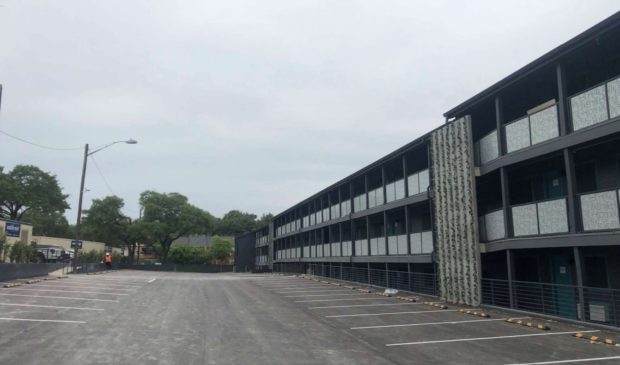BoA postpones parking variance for want of a better hardship
Monday, July 12, 2021 by
Elizabeth Pagano Parking requirements could threaten the affordability of a North Central Austin apartment complex. But finding no hardship – aside from the Land Development Code itself – Board of Adjustment members have asked for more information to better consider a variance request.
“We really feel like what we have is a parking requirement that will either require us, because it’s costly, to delete the number of units to allow on-site parking to suffice, or we will have to raise rents to cover the additional land required to allow for parking,” said Steve Drenner, with the Drenner Group. “Neither one of those seem justified, either in the best interests of the project or what we are trying to accomplish as a city.”
Drenner explained that the project at 8300 N. Interstate 35 is an “unusual” conversion of a hotel into multifamily affordable housing. He told the board that the frontage road hotel is being converted under a restrictive covenant that requires at least half of the units be affordable to those earning 60 percent or below the median family income, but at this point, it looks like all of the units will “achieve some measure of affordability.”
As planned, the project will convert the existing 218 hotel units to 226 residential units: 67 studio apartments, 138 one-bedroom units and 21 two-bedroom units.
The issue with the project is the amount of required parking. To keep the project affordable, Drenner was asking for an 18 percent reduction – 44 spaces – from what the city code requires.
Without the variance, Drenner explained, developers would be forced either to reduce the number of housing units to build more parking on-site or to raise the rents to cover the cost of off-site parking.
“Our code is, at best, somewhat antiquated with regard to parking requirements,” he said. He noted that adjustments to parking requirements have been eliminated downtown and adjusted for preservation and affordability programs, but the “radical change” proposed under the Land Development Code rewrite continues to be on hold, indefinitely.
Drenner said he believed they could set up alternative programs for those who either don’t have a car or need an additional parking space. He said they were finding it was more likely that residents wouldn’t have a car and would need a shuttle or other alternative transportation, and told the board they were focusing on fostering conversation about what renters actually need.
Board Member Brooke Bailey asked Drenner for detailed information on the nearest safe routes to public transportation. “Obviously, we need projects like this, but not at some of the costs that may be the unintended consequences of it,” she said.
“You came to us before and promised you would park this project, and now you are coming back for a parking variance,” Bailey said. “You have some very strong neighborhood opposition and I don’t think there is any nearby on-street parking.”
Board Member Rahm McDaniel said he agreed with many of Drenner’s points about the parking requirements in the code and how it is exacerbating the affordable housing crisis. However, he said, as presented, he didn’t see a reason to vote for the variance other than “The law is bad and I think it should change.” He brought forward a motion to postpone the case to allow more time to put together a better hardship that would support the requested variance.
“I do think the law is bad, and I do think it should be changed. It’s a shame we were a week away from changing it last year and we couldn’t because a judge said we couldn’t,” McDaniel said. “As is, I can’t see a reason to support it, and it would turn my stomach to vote against it.”
Drenner said he would like an opportunity to spell out the hardship and explain how additional parking needs would be addressed, should they arise. Board members voted to continue the case until their July 12 meeting.
The Austin Monitor’s work is made possible by donations from the community. Though our reporting covers donors from time to time, we are careful to keep business and editorial efforts separate while maintaining transparency. A complete list of donors is available here, and our code of ethics is explained here.
You're a community leader
And we’re honored you look to us for serious, in-depth news. You know a strong community needs local and dedicated watchdog reporting. We’re here for you and that won’t change. Now will you take the powerful next step and support our nonprofit news organization?



